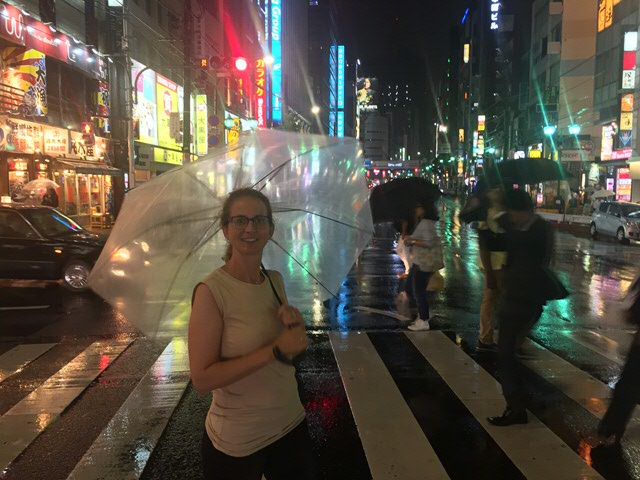Yvonne Gerritsen-Schutte: ‘Je kunt veel dingen fout doen in Japan’
Ze houdt van koken en kreeg de Italiaanse keuken aardig onder de knie in Rome. Japans koken is andere koek voor Yvonne Gerritsen-Schutte (43), die met haar gezin sinds twee jaar in Tokyo woont. ‘Ik kan prima een recept volgen, maar als ik het niet helemaal je dát vind, kan ik lastig bepalen wat ik moet doen. Beetje meer soja, beetje meer sake, mirin of dashi?’ Het voorbeeld maakt goed duidelijk: Van alle landen waar Yvonne woonde is Japan het meest ‘anders’.

Ze studeerde in 1997 aan de RUG af als chemisch technoloog. Sinds 2000 woont ze met man Marc (44) op steeds een andere buitenlandse standplaats. Marc, RUG-alumnus geschiedenis, werkt voor Buitenlandse Zaken. Na Jeruzalem kwam Rome, en toen Tokyo, afgewisseld met periodes in Nederland waar de kinderen Lieke (12), Freek (10) en Lara (8) werden geboren.
De collectieve instelling is wat Yvonne het meest opvalt aan Japanners. ‘Ze houden altijd rekening met de ander.’ Een Japanner gooit geen troep op straat, eet niet in het openbaar en in de metro kun je een speld horen vallen.’
In het snel vergrijzende land kijkt Yvonne vol bewondering naar de vitaliteit van de oude mensen. Hoe ze zonder rollator of scootmobiel naar de winkel gaan en hun stoepjes vegen.
Toch zou de RUG-alumna zelf geen Japanner willen zijn. ‘Ze zien er vaak moe uit. Werk is nummer één. Ze hebben een ontzettend slechte werk-privébalans, door de hoge druk die de maatschappij ze oplegt.’
‘Je kunt veel dingen fout doen in Japan. Het is soms frustrerend, dan weer hilarisch.’ De Gerritsens leren met vallen en opstaan. Neem de slofjes in hotels waar je niet met je schoenen naar binnen mag. ‘In de kamers liggen traditionele tatamimatten waar je juist absoluut níet met die sloffen overheen mag. Naar de wc, op de gang, moet je ze juist wel aan, maar weer niet ín de wc. Daar staan speciale wc-sloffen waarbij je niet moet vergeten die na gebruik om te draaien, zodat de volgende er makkelijk in schiet.’
Alle gezinsleden leren Japans. Maar het blijft ‘leven in een bubble’, zegt Yvonne. Een appartement in een woonwijk met westers georiënteerden, praktische steun van de ambassade. De kinderen, die binnenkort met papa en mama de Mount Fuji gaan beklimmen, zitten op een Amerikaanse school.
In Nederland werkte Yvonne bij Akzo Nobel, tegenwoordig begeleidt ze jonge mensen bij het schrijven van businessplannen. Ook geeft ze Engels aan Japanse kinderen en doet verslag van haar verblijf in het verre Azië op een blog van de glossy Linda. Nog een jaar, dan zit dat verblijf er op. De volgende halte is onduidelijk en daarmee ook de toekomst van Yvonne zelf. De afgestudeerd scheikundige denkt niet dat ze in haar oorspronkelijk vak nog weer aan de slag gaat. ‘Ik zal niet snel meer terugkomen in loondienst bij een grote multinational. Maar ik heb zoveel dingen gedaan en ik kan zoveel, dat ik me echt wel ergens nuttig kan maken.’
Tekst: Ellis Ellenbroek
Bron: Broerstraat 5, het alumni magazine van de Rijksuniversiteit Groningen
